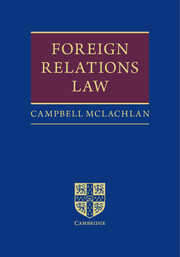Book contents
- Frontmatter
- Dedication
- Contents – summary
- Contents
- Preface
- Acknowledgements
- Table of cases
- Table of treaties
- Table of legislation
- List of abbreviations
- Part I Sources
- Part II The foreign relations power
- 4 The executive
- 5 Parliament
- 6 The judiciary
- Part III Foreign relations and the individual
- Part IV The foreign state
- Bibliography
- Index
- References
4 - The executive
Published online by Cambridge University Press: 05 September 2014
- Frontmatter
- Dedication
- Contents – summary
- Contents
- Preface
- Acknowledgements
- Table of cases
- Table of treaties
- Table of legislation
- List of abbreviations
- Part I Sources
- Part II The foreign relations power
- 4 The executive
- 5 Parliament
- 6 The judiciary
- Part III Foreign relations and the individual
- Part IV The foreign state
- Bibliography
- Index
- References
Summary
The exercise of the foreign relations power within the constitution
In public international law, the state is a unitary concept, since
The conduct of any State organ shall be considered an act of that State under international law, whether the organ exercises legislative, executive, judicial or any other functions, whatever position it holds in the organization of the State, and whatever its character as an organ of the central Government or of a territorial unit of the State.
But an account of foreign relations law within Commonwealth states must consider the distribution of the foreign relations power between the three primary organs of government – executive, legislature and judiciary. That is the purpose of Part II of this work.
Traditionally the British constitution concentrated the foreign relations power on the executive, as an exercise of the prerogative power of the Crown. The decision to leave the exercise of the foreign relations power with the King at the time of the Bill of Rights 1688 has proved a remarkably durable Grundnorm in the constitutional arrangements of the Anglo-Commonwealth states. The contemporary scope of this principle will fall to be considered in this chapter. But the central proposition of Part II as a whole is that modern Anglo-Commonwealth constitutions have witnessed a considerable redistribution of the foreign relations power towards greater supervision and control both by Parliament and by the courts. This is so both under the largely unwritten constitutions of the United Kingdom and New Zealand and under the largely written constitutions of Australia and Canada. Indeed, for the most part, the developments have not been mandated by constitutional text, but instead represent an important evolution in living constitutional practice. This development has been engendered by two interrelated factors, each of which reflects the impossibility of maintaining a strict distinction between the international and the national spheres. Parliament in each of the relevant Commonwealth states has extended its role in the light of the impact of foreign relations decisions on the domestic polity. At the same time the courts have increasingly reconsidered their deference to the executive in foreign relations matters, especially in cases where the exercise of the foreign relations power has a direct impact on the civil rights of private persons.
- Type
- Chapter
- Information
- Foreign Relations Law , pp. 113 - 148Publisher: Cambridge University PressPrint publication year: 2014



